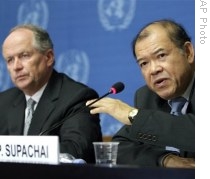Geneva
07 September 2009
The U.N. Conference on Trade and Development is calling for stricter regulation of world financial markets. In its annual Trade and Development Report, UNCTAD blames excessive deregulation and risk taking for causing the financial turmoil.
UNCTAD finds the financial crisis has turned into a full-fledged recession, affecting practically all markets and countries. It says the crisis is having a particularly dramatic impact on developing countries. It says it will be virtually impossible for poor countries to meet the U.N.'s Millennium Development Goals of cutting poverty in half by 2015.
UNCTAD economists largely blame deregulation of financial markets for the global financial and economic crisis. They say speculation fever has strongly influenced this process.
 |
| UNCTAD Secretary-General Supachai Panitchpakdi, right, and UNCTAD Director of the Division on Globalization and Development Strategies Heiner Flassbeck (File) |
"UNCTAD does feel that this rebound could be a temporary rebound," he said. "The depth of the recession and the slowdown has been so great that, of course, there must be some rebound to come. But, this is a rebound from a very, very deep drop in the level of prices, asset prices, commodity prices and also the level of production. Without the real strengthening of macro-economic fundamental factors, we still do not see that this will be a real recovery."
The crisis that initially began in the financial sector, the report says now has turned into a dramatic downturn in the real economy. It says global GDP is expected to fall by more than 2.5 percent this year. And virtually no country has been left unscathed by the crisis.
The report says GDP in the developed nations will contract by some four percent, output in transition economies is expected to fall by more than six percent and growth in developing countries will decline from a high of nearly 5.5 percent in 2008 to more than one percent in 2009.
It says even countries that have growing economies, such as China and India, are slowing significantly compared to previous years.
Despite the pain inflicted by the financial crisis, UNCTAD Senior Economist Heiner Flassbeck says few lessons appear to have been learned. He says speculation is making a comeback and is driving commodity prices up again. He says the speculation is being driven by anticipation of the recovery of the market.
"But, the anticipation of recovery is just a fiction. It is not definitely there already...You cannot see a self-sustained or at least a strong, sustainable recovery of investments yet. Clearly, what we see, and we have advocated that all the time, the government intervention has helped, has very much helped," said Flassbeck. "The big developed countries and the bigger developing countries were able to reduce their interest rates. They were able to use their policy space for fiscal stimulus."
Flassbeck says stimulus plans have clearly helped to stabilize the world economy. Nevertheless, he says UNCTAD believes it is premature to talk about self-sustained recovery right now. He adds, it is dangerous for governments to talk about exit strategies for the huge public debts or monetary policies.
He says the world economy is still in a very fragile state. So, governments should proceed with extreme caution regarding their economic policies.
UNCTAD predicts that global GDP growth may turn positive again in 2010, but growth, it says, is unlikely to exceed 1.6 percent.